How a Two-Person Team Made the Most Interesting Farming Sim of the Year
Interviewing the creators about their journey of making Before the Green Moon

About two months ago, I was lurking on Discord when I saw a trailer for a game I’d never heard of before. It was called Before the Green Moon, made by the small, two-person studio Turnfollow.
I was immediately smitten with its aesthetics: the gently melancholic music, blocky character models, and naturalistic, slightly grimy textures. The description was also intriguing: “Before the Green Moon is a farming/life simulation game set in a unique science fiction world.” What made this world so unique? What was its vision of the future, and how would that translate into the discrete, infinitely repeatable gameplay loops of something like Stardew Valley or Animal Crossing?
Source: YouTube.
After a solid 15 hours in the game, I had my answer: Before the Green Moon is one of the best experiences I’ve had with a game this year, using the structure of a farming sim to paint a grounded, melancholic portrait of a small community at the bottom of a space elevator. Your character comes to this small town in order to save enough money for a ticket to the moon. But as your relationships with the other townsfolk deepen, you may wonder what choice is right. The game made me reflect on the thousand happy accidents and missed opportunities and idiosyncratic, confused choices that led to the life I have now. Before the Green Moon looks like a Playstation 2 toybox of a game, but it feels like real, adult life.
When I spoke with the two developers at Turnfollow, Carter Lodwick and Ian Endsley, our conversation looped around these ideas. We discussed their inspirations, the challenges that arose during the development process, and the ways that games can feel like miniature worlds. We also talked about bicycle rogue-likes – or roguebikes.
This is the first game of yours that I’ve played. In the middle of playing it I went back and played [your previous game] Wide Ocean Big Jacket as well because I was really curious about the other stuff that you had made. It seemed to me that Before The Green Moon is a different kind of game from what you’ve done before – it felt a little gamier, from my perspective. What made you want to move in that direction?
Lodwick: I think Ian and I both have different answers to that question. In general, I think the longer you work as a game developer, the more you know how to do, and the more skills that you get comfortable or semi-comfortable with. It can become very appealing to try your hand at these more ambitious, existing game genres and mechanics. That was something that I definitely wouldn’t have tried to do when we were making some of our earlier games, because I guess it felt more far off, more far away. But we just know more than we used to. It’s funny, because it really has been this pretty even increase of, like, years spent doing this and interest in traditional game mechanics.
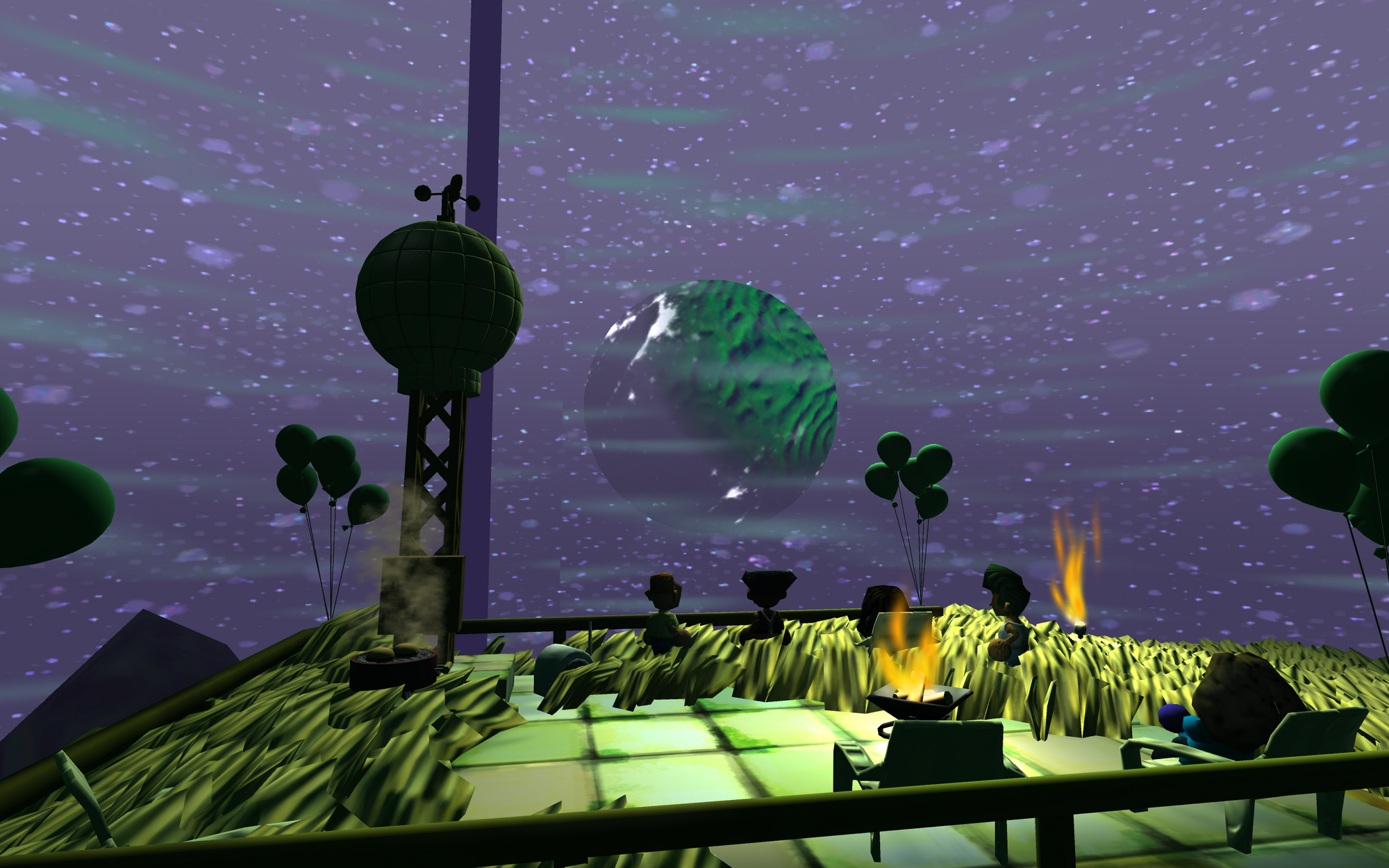
Endsley: I have exactly the opposite answer. The first thing I tried to do when I learned how to make games was make a farming sim. [laughs] And I feel like I’ve tried a couple times since then. But like Carter was saying, it’s really hard to make a farming sim, and this was maybe the first time our skills were equal to the task. In terms of storytelling, or what games mean to me as stories, I think that... all the gamey-ness aside, just the way that time passes [in a farming sim] and the way that you are in a kind of living place is really interesting to me, and something I want to explore further. But trying to borrow the farming sim structure also allows you to use something existing as a reference point, so you don’t have to solve every problem on your own.
Lodwick: Yeah, I think that there were maybe smaller elements of that, of borrowing from existing games or standards or something in previous projects of ours, but this is definitely the first one where we could kind of point to a game and say, “We’re making one of these.” In the past, it’s been more about picking different specific elements from different things and mashing them together and then finding out what the shape of that is. This one had kind of a clearer goal from the start.
When you started this project, were you going into it thinking, “we’re going to make a farming sim”? Or did that gameplay structure apply itself further down the line?
Lodwick: We went in with the goal of making a farming sim game, kind of in the mode of, specifically, Harvest Moon 64. Ian is the one who’s played a lot more of these, so he was kind of the keeper of knowledge of farming sim convention and stuff like that. But yeah, we talked a lot about Harvest Moon 64 and the Gamecube one-
Endsley: Wonderful Life.
Lodwick: Wonderful Life, yeah. [And] Stardew. You kind of have to think about it.
Endsley: Yeah, those are the big ones. I’ve played a lot of other ones, but a lot of the other ones just kind of came in determining how I liked how certain things felt over others, or if something had changed the formula in a way that I felt like was interesting. But mostly [we were] trying to think about Harvest Moon 64.
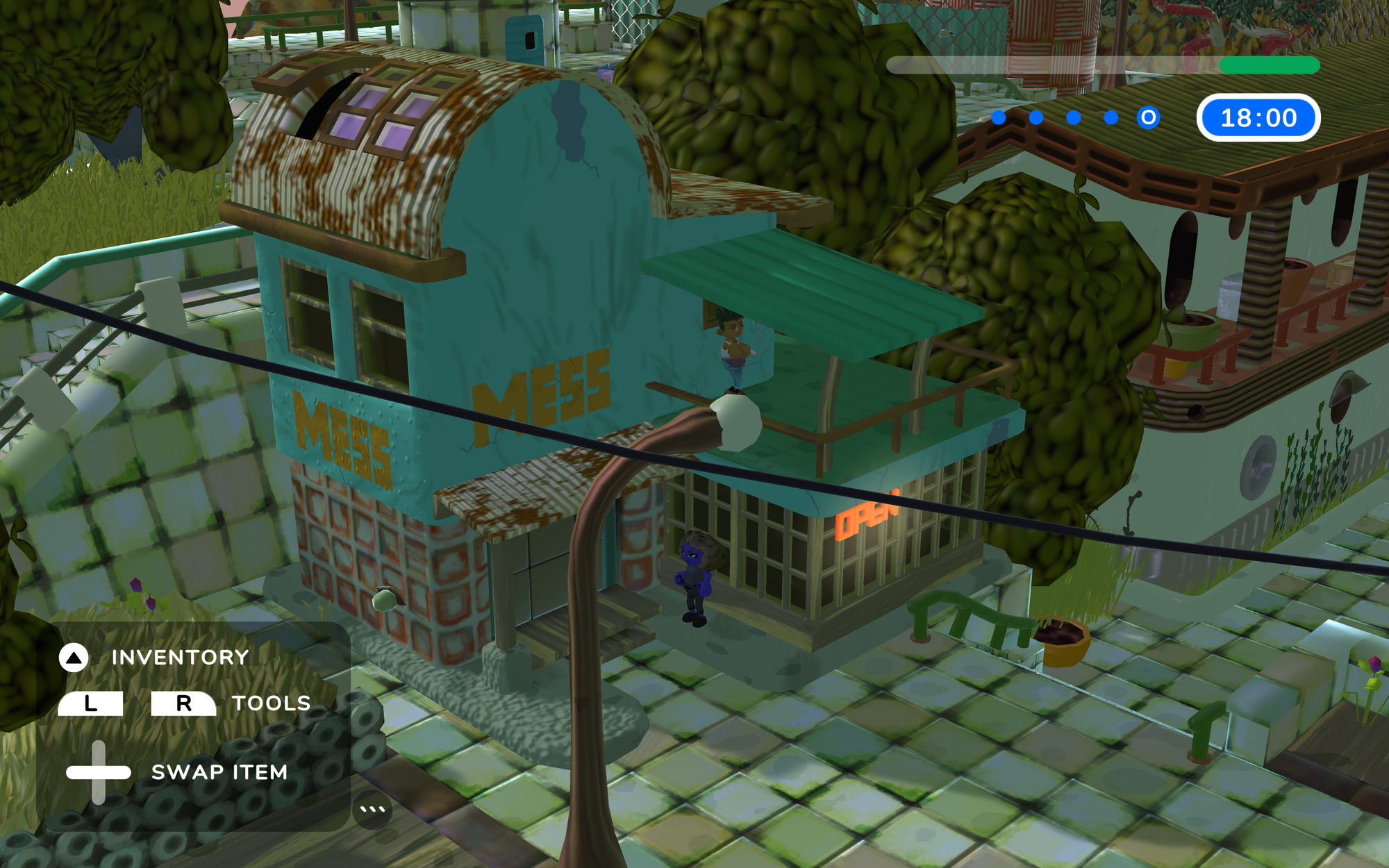
I’m going to reveal a gap in my own knowledge which is that I have very little experience with Harvest Moon. Do those games do storytelling in the same way that Before The Green Moon does? Because I found that very striking [in this game].
Endsley: Honestly, I need to go back and play one now. I was playing them a little bit as we were developing, but I was mostly relying on how the stories felt to me, especially as a kid. And the way that it felt like a real place, or like you were in a real life. [I was] trying to capture the way that that felt. So I’ll have to play it again and see. [laughs] Something I wanted to find out making this was, “What does it feel like to try to make one of these?” I wanted to know how much you were able to be in control of how the story came out [as a developer], and how much you had to rely on the player filling in the gaps.
Lodwick: I remember we talked a lot about, like, character opacity. Those [older] games are using archetypes to an extent, but playing one for the first time or playing it as a kid and having less knowledge of what those tropes and character types are, it could take a really long time before a character fully revealed themselves to you. Rather than [having] the first thing they say to you, the first conversation, that’s like the developer telling you, “Okay, this is this type of character, they’re filling this role in the story. You know it and you love it.” [laughs]
I think Before The Green Moon is definitely kind of burdening the player with being interested in figuring out what the characters are like. Because, especially early on, most of them are fairly withholding from explaining themselves to you. Which is hopefully an asset, you know? But we were definitely leaning on this inherent expectation that people weren’t going to like, put it down after one hour and assume that they got the gist of it. It takes a while to unfold.
That was one of the things that I really attached to with it. Because it also felt like – and I don’t know if this was on the proverbial mood board or not – but it reminded me a lot of the first Animal Crossing. Because one of the things that I really love about that game is like... everyone is kind of mean to you. [laughs]
Lodwick: Yeah. [laughs]
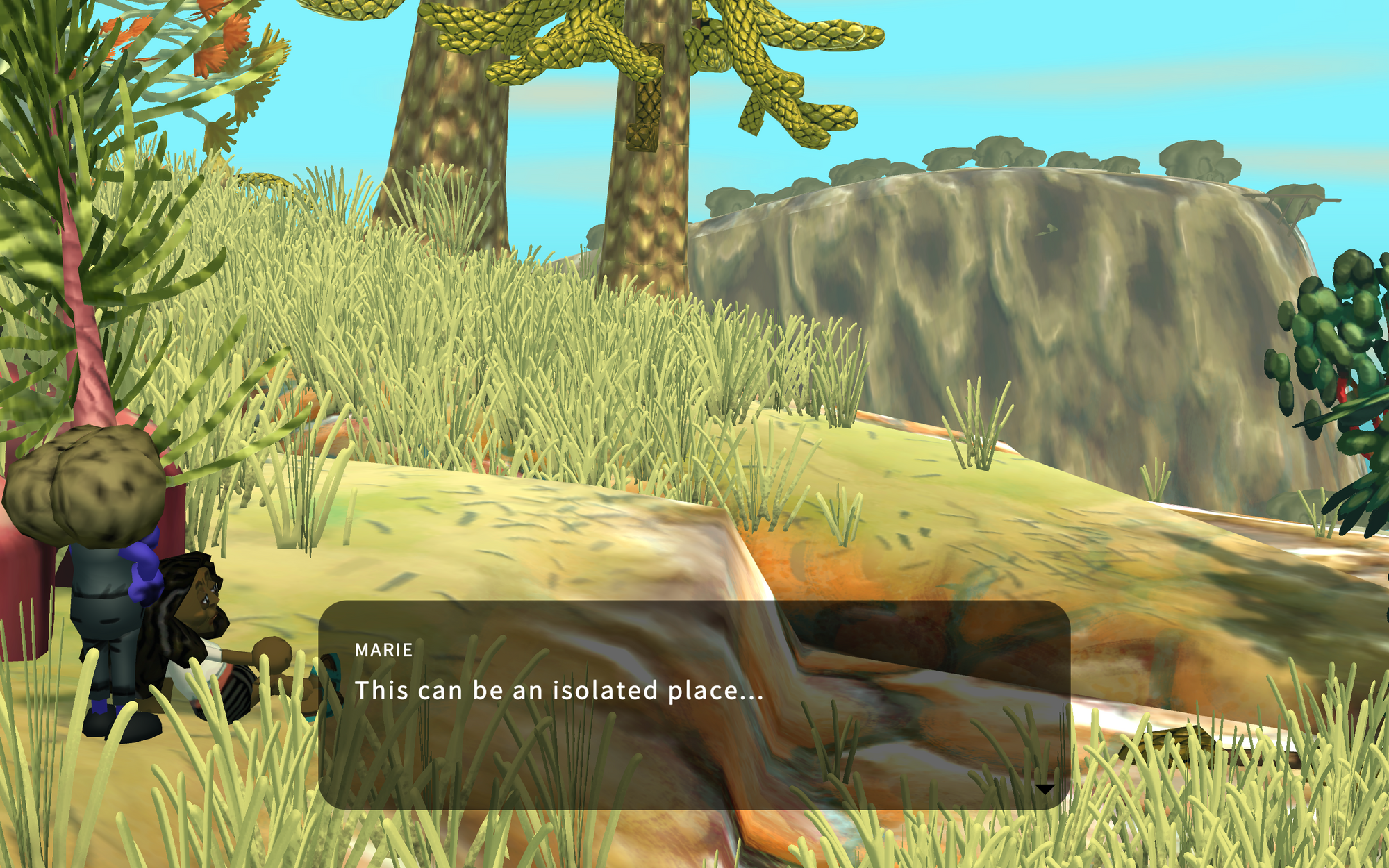
And I liked that in this game, too. When you first come to town, it’s not that people are necessarily aggressive, but they’re like, "Who are you? What are you doing here?" I found it really compelling.
Lodwick: It creates more distance between you and that person that can be crossed, rather than being like, “Oh, hello new person, we’re already friends!” There’s this journey you get to take with them, rather than arriving at this nice ideal state. I think it’s probably also important for these games to have some characters who just never like you. [laughs] You shouldn’t be able to befriend everybody in the world. It helps make it feel real.
Something that I found really cool was the way that the interactions are parceled out over time. What determines when you’re seeing those events or story arcs? Is there some variation in terms of when things happen specifically, or is it all very locked in?
Endsley: Everything’s kind of driven by the player’s interest. The more that you interact with any character, that unlocks the ability to see certain events. And then those events are tied to a specific place and sometimes a specific time. Like, [the character] Int, for example, is in their own section of the map, so there were definitely people who never saw a lot of the Int story because they just stopped going over there. It was a little scary. [But] part of what I’m interested in as a developer is player-driven interest, and rewarding that.
Lodwick: The dynamics you’re describing – triggering story beats and stuff – feels like that made up the most of the period of development that I can recall. [laughs] Most of playtesting was figuring out if those systems were working correctly. Credit to Ian for doing a lot of that, doing run-through after run-through of the game, drilling into each character, and trying to get a sense of how that pacing was actually working. That is one of the more enormous tasks of deciding to make a game like this because a playthrough is so long and is potentially going to look really different depending on who’s playing. And it’s supposed to be this kind of game that you sort of settle into and chip away at, as opposed to a roguelike or something, where one playthrough is half an hour to an hour.
I think we should make a roguelike next because it seems like it would be a lot easier to test.
I’d love to see what a roguelike made by y’all would look like, that would be really fun.
Lodwick: I’ll have to think about that. [laughs]
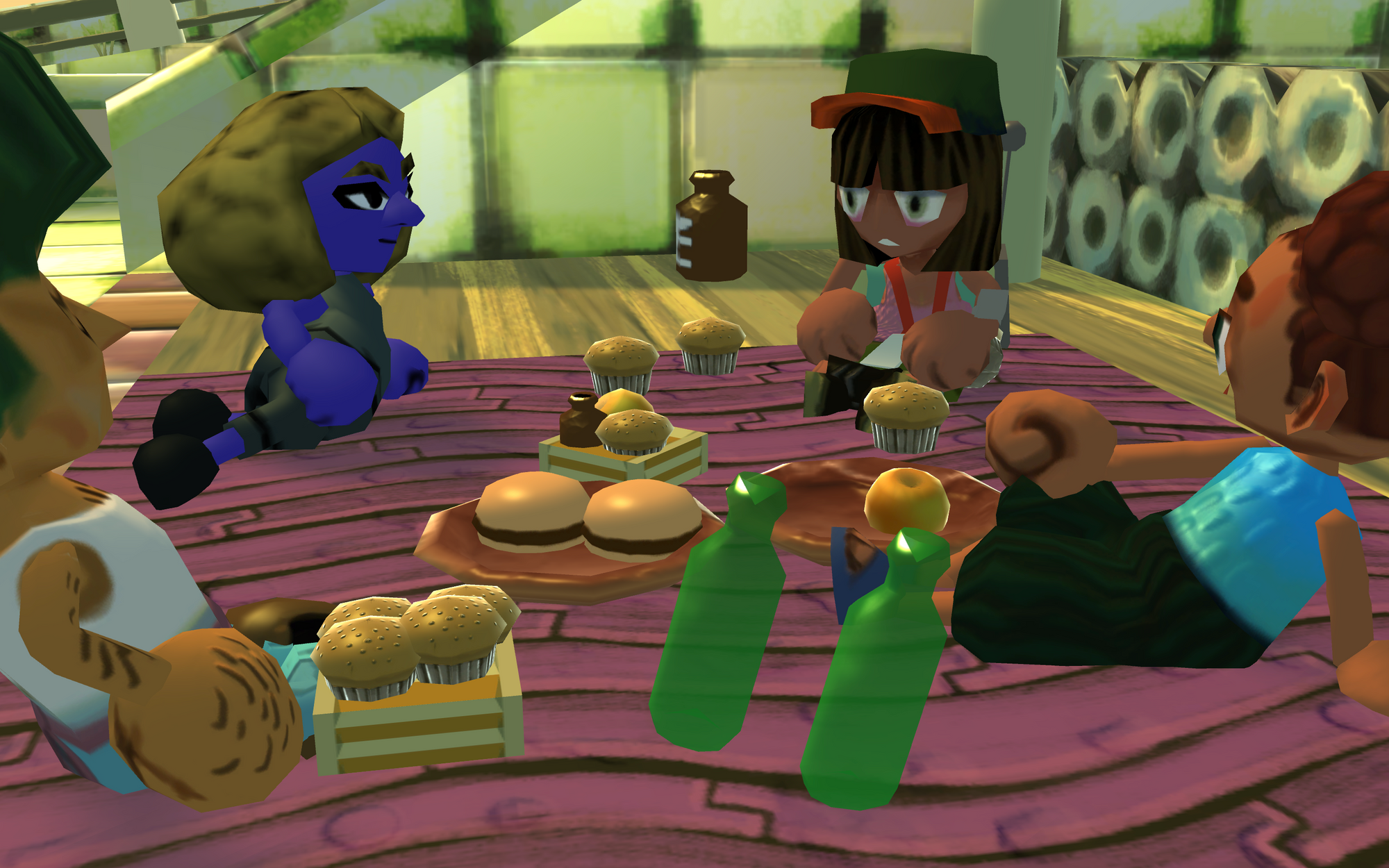
That also leads into one of my other questions – I was wondering if there were any intended features or ideas that didn’t end up making it into the game, or conversely, anything that ended up in the game that you weren’t expecting at the start?
Endsley: There’s a baseball and a baseball bat in the game, and there used to be a baseball field, and the dream of [town] baseball playing. That didn’t make it. There’s a lot of stuff – Carter, if there’s anything specific you remember –
Lodwick: One of the dev options that’s been in the game since the very beginning was a sprint button. We always knew the pace of the game that we wanted; we calibrated the character controller to that. A lot of the game [is] set based on how efficient a min-maxing type of player could be in their movements. So the run speed actually has a lot of weight over a lot of things. But it wasn’t even a sprint button that we had – what it did was it actually sped up the timescale of the game, so it would feel like you were walking super fast, but everything was going in fast motion.
Anyway, we frequently would have different ideas for what our game’s sprint mechanic could be. We didn't want it to be a sprint, because we just didn't like that idea. It became a bicycle for a while, or a hoverboard, something kind of small – I've always loved the Costume Quest Heelys that are like that game’s version of a sprint. That always felt so beautifully diegetic, so I wanted to do something like that. But there were too many problems. It’s like, is it an item or a piece of equipment? How do you handle stairs? There were animation issues, and it was never quite necessary enough to potentially have to rewrite a lot of core systems around including it. But I’ve always wanted to put a bicycle into a game. We’ve yet to do it.
Maybe in the rogue-like.
Lodwick: Yeah. [laughs]
Endsley: Roguebike. [laughs]
Lodwick: We’re on our way to a game pitch here! We’re assembling a list of features.
I was so curious about that baseball, too. I got the baseball and the baseball bat, and I was carrying them around in my inventory talking to everyone hoping I would trigger a baseball sequence, and it just never happened.
Endsley: I’m so sorry. I wish it did.
No, it’s okay! It’s just nice to hear that it was there at one point. I feel a sense of peace about that now. [laughs]
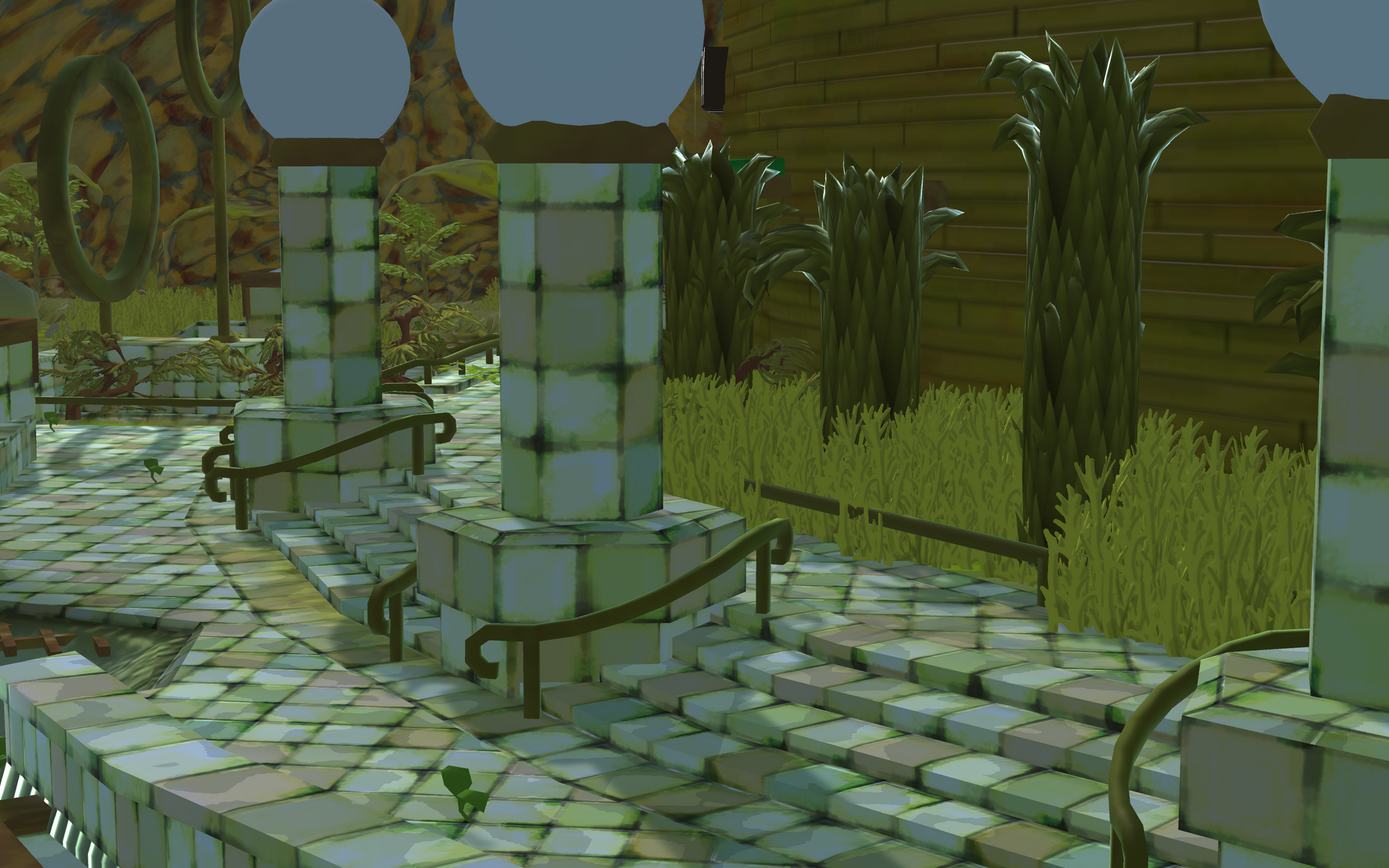
I was also curious what the aesthetic inspirations for the game were. Because, obviously Harvest Moon – I was also thinking Animal Crossing, though I don’t know if that was something you were thinking about. Something about the perspective also reminded me a little bit of Chulip, so I was curious what that thought process was.
Lodwick: I did play a few hours of Chulip somewhere in the last three years while we were working on this. I think I just sat down with it one night and got as far as I could, and then stopped playing it. I really liked it. Well, I shouldn’t say I really liked it, I decided to stop playing it because it was pretty frustrating [laughs]. But I was very interested in it.
Ian and I are both of the age where I think [the way] PlayStation 2 and Gamecube games looked is just always going to be inherently appealing to us. And this game, obviously, is kind of drawing on that. Games these days are built so much on reused assets and assets built semi-procedurally, or with a lot of assistance and tools. There’s something really really satisfying about going back to a Gamecube game or a PlayStation game, where it feels like a physical model that somebody made and there’s no real trick to it.
Endsley: I always really pushed textures. I like how stuff looks with naturalistic-looking textures on it, and I feel like that was often the thing I reacted strongest to. I love how physical things can feel.
Lodwick: Animal Crossing, the new one, is sort of a reference because of how physical everything feels in that game, how much they’re using their shaders and the materials are calibrated to make everything feel like a real toy or a model. That’s something that all of the Switch first-party Nintendo games have. And the camera, the way it’s always looking down on everything, I think I kind of wanted the whole game to feel a little bit like a miniature. Not literally, but to evoke that feeling. That’s something that video games are pretty forgiving towards, just because they are literally miniature worlds. It feels right to acknowledge that in the look of them.
I was also curious about, musically, how that developed. I really love the music in this game, so I was wondering what that process was like.
Lodwick: We spent a lot of development putting off music. There were too many other questions about what the game was going to be. There were a lot of unknowns with the tone and what the world was, what the sci-fi setting was. I decided at some point that I was going to try to write as much of the music as I could, so some of the stuff that’s in there is little songs that I wrote. And then as we got close to release, I reached out to a couple of musicians we’ve worked with on our other games – Scott Archer, who did all of the music on Wide Ocean Big Jacket, and Marissa Deitz, who we’ve worked with on some other older games, also came in. She wrote the title theme on the organ, a few other ones. So we worked together – Scott and I, especially, threw some songs back and forth. He would take a pass at it, or he might write something new and he would send it over to me, and I would remix it or do something like that.
In general, we were trying to get the right tone and the right texture, like figuring out how synthy it was supposed to sound versus how many more organic instruments to use. A fun little accident that we discovered when we started putting music in cutscenes was that you’d get out of the cutscene, the camera would pull back, but the music that was playing in it would continue. That created this really nice feeling that we hadn’t engineered because it felt like you were still in this afterglow of wherever the emotions landed in that scene.
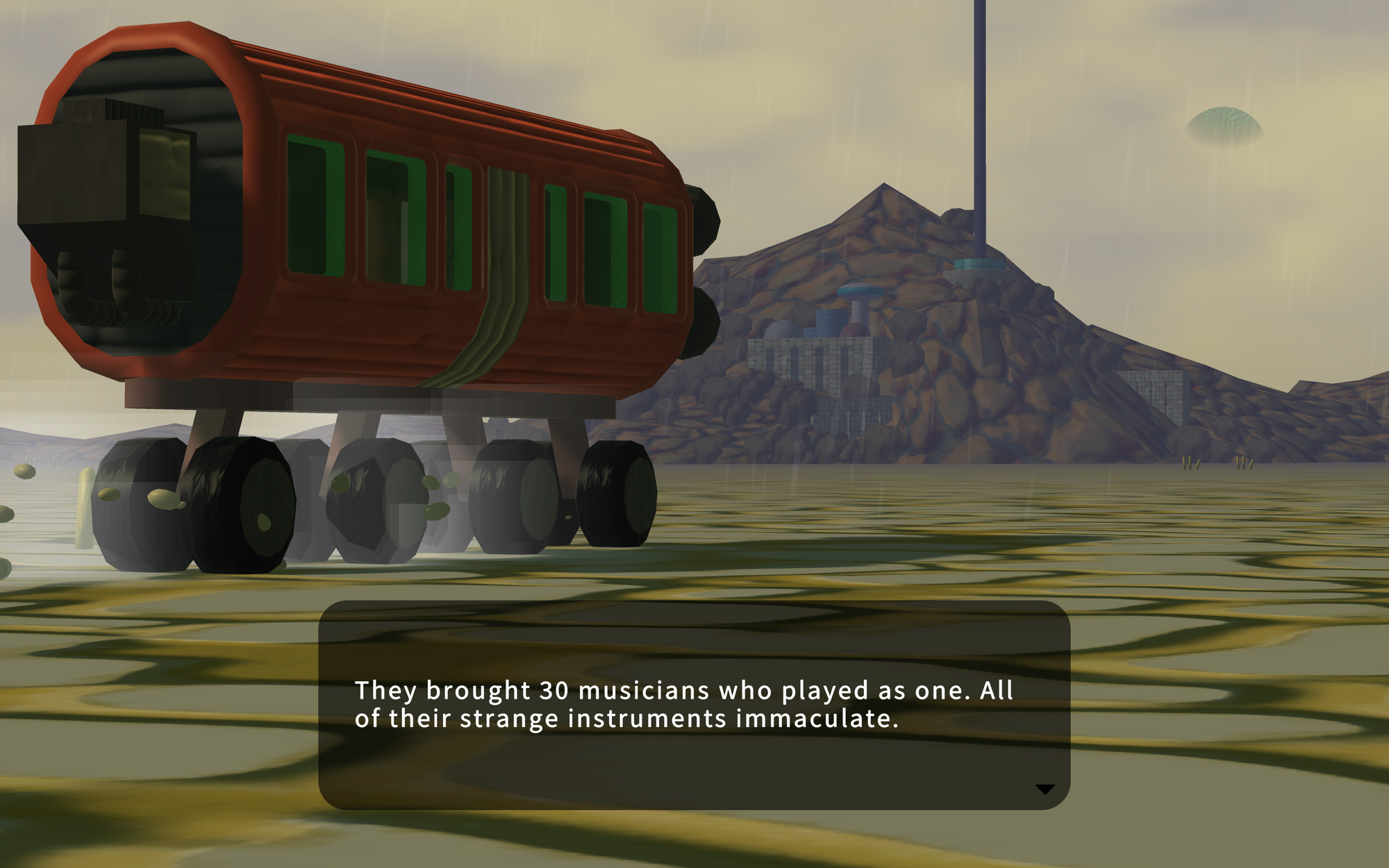
You said something about the tone of the game, too. It feels very unique in what it does, and I was curious about how you ended up arriving at that final feel?
Lodwick: Ian, do you have anything to say about tone?
Endsley: [laughs]
Lodwick: It’s definitely, like, everything.
Endsley: Yeah.
It’s a very big question.
Endsley: The tone is this huge mix of where we were at over the past three years, and it feels really hard to even understand-… I feel like it’ll take a couple years to even understand what the game means to me.
Lodwick: Yeah, like to actually be able to open it up and look at it and kind of understand the person who made it. To be able to recognize, like, you were dealing with this, or...
Endsley: I was trying to imagine, as best that I could, a place that felt better than where we are. Not in a fantasy way, but in an incremental way. And then all the characters became... the unifying theme for all the characters was, like, “People who weren’t comfortable, still, in this incrementally better place.” What I was trying to uncover was a better place, but naturally I felt like the characters were still struggling.
Lodwick: I wonder how much of that had to do with [how] the setting just kept getting gloomier and gloomier, and we were faced with writing these characters who were in this kind of ruined little town. It’s not really ruined exactly, but you know.
Endsley: [I] definitely was reacting to the way it ended up looking. But that’s something that makes it fun or enriching to work on and collaborate. You’re not just pushing forward, but you’re always reacting to the thing as it evolves.
Lodwick: Yeah, it makes it easier. That’s the best part of collaboration, is that not all the ideas came from you, and some days you get to bounce off of some new information. I think, more than previous games, this one felt like a lot of what’s there at the end was more instinctive than calculated. I definitely was not in complete control of everything that I put into the game – there were multiple stretches where it was just like, “I need to just keep working on it, and keep making things, and hope that something is congealing here, that the pieces are going to stack on top of each other in a way that works.”
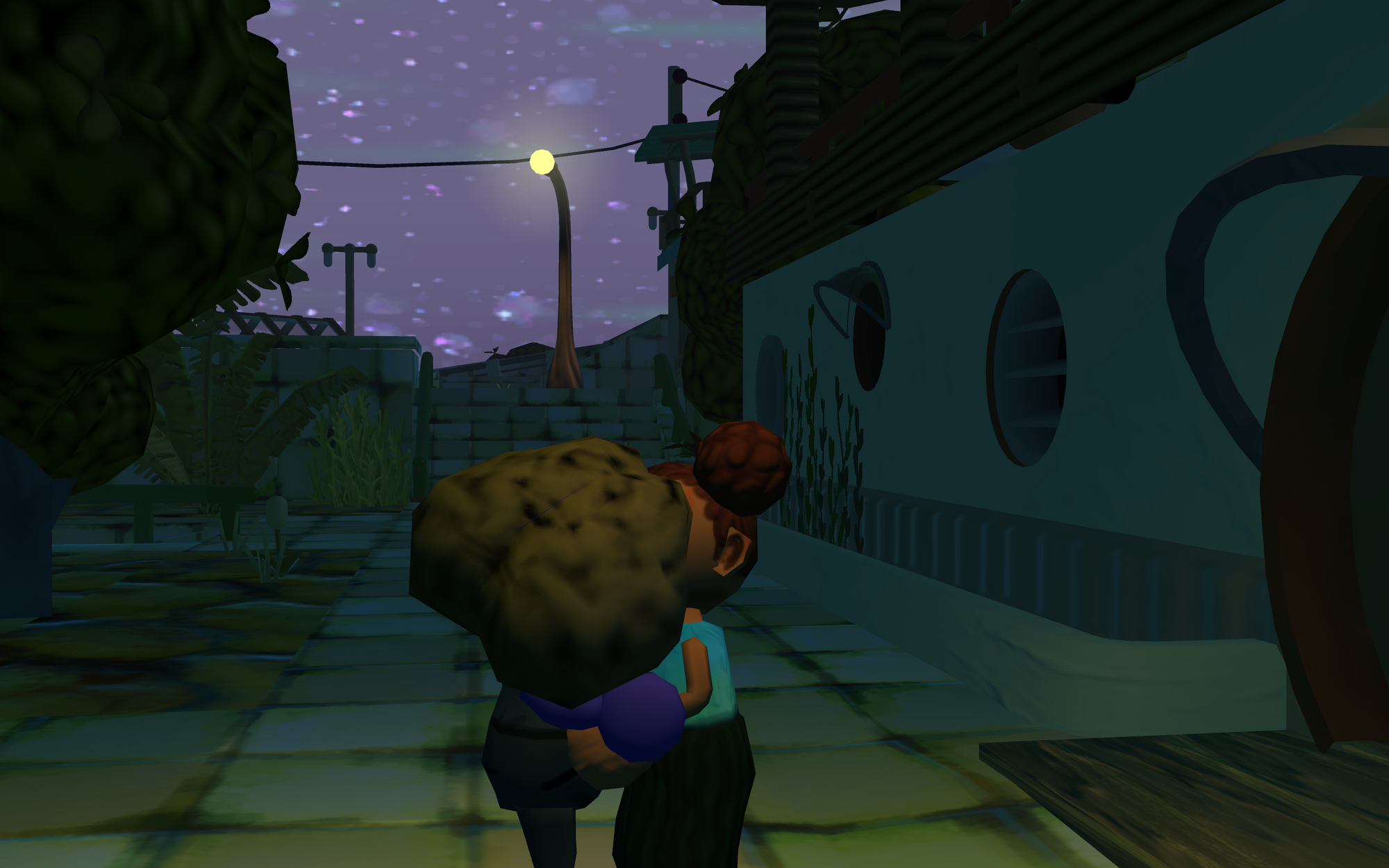
That pretty much covers everything. The only real question I have left is, what’s next for y’all?
Lodwick: A roguelike about riding bicycles. [laughs]
I’m down!
Lodwick: We have a bunch of unreleased bicycle game prototypes that I’m constantly wishing I’m working on. So maybe something like that... or something different. I’m finishing an outside project with a company I’ve been working at part-time for a few years. After that, I don’t know. I think we’re kind of feeling things out. Ian, maybe you have an obvious answer to this. Maybe you’re working on some game right now that I don’t know about.
Endsley: Ah, no...
Lodwick: Dammit! [laughs]
Endsley: [I'm] just reflecting, and gonna learn. I really don’t know.
Lodwick: This was a really long development cycle for us, and I’ve been personally relishing the opportunity to just not think about this game. The last year or so, we have been in the zone of thinking about [the game] in terms of other people, in terms of players and reception and release and price. I hope that when the next idea does take shape, it can live for a while in a zone where I’m purely delighted by playing it.
I hope that you get that too. I’m sure Roguelike Bicycle Game will be very fun!
Lodwick: I would play it, I think, if I saw that somebody released that.
Did y’all have anything else that you’d like to add?
Endsley: Do you mind if I ask you, did you go to the moon?
I did. After [a late story beat involving the character Int], I went through what seemed like all of their dialogue after that. The last thing they said to me was something along the lines of, “This is my home. Is this yours?” It felt like a really good place to cut it off.
But I had a really emotional response to that ending, because I was like, "There might be more here that I don’t know about, and I just have to make peace with that." Which felt very real to me as a player. And I’ve never really felt that in a game before, so it was really cool to have that experience.
Endsley: It’s really nice to hear that that worked for you, because it was kind of scary – it still is kind of scary – trying to make something that posed questions that I’m always having when I’m playing games. Thank you for talking about that. It means a lot that you played it and that you went all the way to the end, and I’m really glad to hear that it meant something. So thanks.